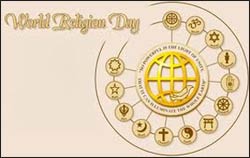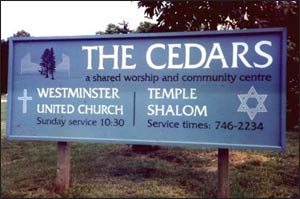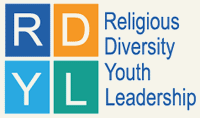EDITORIAL
World Interfaith Harmony Week a Great Success in Canada
Only in its third year, the World Interfaith Harmony Week at the beginning of February registered over 300 special events in about 50 countries around the Globe, such as Austria, Australia, Cambodia, Egypt, Finland, France, Guyana, Jordan, Kuwait, Macedonia, Malaysia, New Zealand, Pakistan, Philippines, U.K., and U.S.
In Canada we know of events in at least seven provinces: Surrey, British Columbia; Abbotsford, B.C.; Edmonton, Alberta; Winnipeg, Manitoba; Toronto, Ontario; Montreal, Quebec; Charlottetown, Prince Edward Island; Antigonish, Nova Scotia; and probably more.
Toronto participated for the first time, with two events:
Baha’i Unity Choir
“Celebrating Interfaith Culture” in a dinner sponsored by the Toronto Chapter of the Islamic Supreme Council of Canada, on Friday, February 1st. We had songs from the Baha’i Unity Choir and a Lutheran Choir. We had some Islamic and Hindu chants, and Sufi poetry. All 80 of us sang an interfaith peace chant: “Shalom, Salaam, Shanti, Pacem, Gowa (first nations), and Peace,” originally composed by Rabbi Schlomo Carlbach.
“The Importance of Interfaith Dialogue and Co-Operation” was sponsored by the Toronto Japanese Cultural Centre and the Toronto Area Interfaith Council (TAIC) on Thursday, February 7th. Some 50 people braved the beginnings of a major snowstorm. Speakers made it from seven faith groups:
Interfaith panel at Japanese Cultural Centre
Baha’i, Buddhist, Hindu, Jain, Jewish, Muslim and Zoroastrian. They explored their faith’s approach to others, and outlined ways they could work together.
A steering committee, under the energetic leadership of John Voorpostel, is already planning an even larger set of celebrations of interfaith harmony in the Toronto area for next year. There is a special feeling of unity, knowing that others all around the world are celebrating interfaith harmony at the same time, with the blessing of the United Nations.
We are happy to bring you news stories and upcoming events in diverse Canadian locales. And we congratulate the Religious Diversity Youth Project (see Resources below) for obtaining a $500,000 grant from the Federal Government. Youths in the community could apply to participate.
* * *
NEWS
“Faith in the City:” Interfaith Meeting Takes over Toronto City Council Chamber
A Multifaith Symposium for Faith Communities Working Together to Build the City
The Catholic Register, January 24, 2013, Toronto
Rev. Brent Hawkes chairs Faith in the City
Faith leaders and concerned citizens replaced politicians in city council chambers to hash out how faith communities can increase their participation in city building.The multi-faith symposium Faith in the City took over Toronto’s council chambers Jan. 24. Five workshops were the main focus of this free, half-day event, with homelessness and housing, food security and poverty, disadvantaged youth, after-school programs, and refugees on the agenda.
“Religion has a space and a place to play, and a role in regards to attaching its own meaning and understanding to what the issues are,” said Fr. Damian MacPherson... “To whatever degree religion loses its power and presence in society, it’s to our own disadvantage. Religion has a voice and it needs to be heard, and it should be spoken clearly without bias.”
City Councillors Joe Mihevc, Mike Layton and Sarah Doucette were among the politicians attending the event. Doucette said the community trusts faith groups, as she has seen with the 18 faith groups represented in her ward. But she finds that often their good deeds overlap. “The faith groups have a lot of contacts… Why aren’t we working together? As a group you can have a lot more effect,” citing programs for the homeless as an area where different faith groups may collaborate.
Joe Mihevc (left) with Paul McKenna
Councillor Joe Mihevc presented an award to Paul McKenna of Scarboro Missions for his teaching and work in the interfaith community: “In recognition of creating the ‘Golden Rule’ poster, which illlustrates the united vision of world religions to build the common good and a more compassionate society.”
[Read more...]
Justice and Compassion: Where is the Balance?
World Religion Day Multifaith Panel, University of Victoria B.C.
Canadian Baha’i News Service, January 31, 2013

There were two panels of four speakers each, representing eight different faith backgrounds: The first panel of four discussed the question “How do we balance compassion and justice, based on the teachings and spiritual principles of our respective faiths?” The representatives for that question were Muslim, Buddhist, Christian and Aboriginal. The second question was “What does a compassionate world and compassionate community look like, especially when dealing with those who hold a different world view?” This was responded to by a Baha’i, a Jew, a Hindu and a Sikh. More than 150 people attended.
A recurrent theme was the need for true justice to be both restorative and compassionate. Dr. Mary-Wynne Ashford of the Victoria Baha’i community said that boundless compassion and generosity towards one’s fellow human beings were important for establishing justice... Sabrina Williams spoke of Aboriginal spirituality, of which the concept of restorative justice is a foundational tradition.
[Read more...]
Advancement of Interreligious Understanding Award in Winnipeg, Manitoba
Redwan Moqbel Awarded
Canadian Baha’i News Service, January 18, 2013
Dr. Redwan Moqbel receives award from Lieutenant Governor of Manitoba, Philip S. Lee. Photo: Keramat Momtazi
The third annual ceremony to present the Lieutenant Governor’s Award for the Advancement of Interreligious Understanding took place on January 8th at Government House in Winnipeg, Manitoba. This year’s award was granted to Dr. Redwan Moqbel of the Baha’i community of Winnipeg “in recognition of significant service to the citizens of Manitoba, through his advancement of the principle of the ‘oneness’ of faith and harmony between religions, his tireless volunteerism as bridge-builder between peoples and between inspiration and science.”
The award was established by the Honourable Philip S. Lee in 2011 and is awarded annually to recognize an individual who best embodies and promotes understanding between all religious groups. Past recipients include Dr. Atish Chandra Maniar, a Hindu priest, Mae Louise Campbell, an Ojibway Métis elder and Zane Zalis, a composer and musician.
[Read more ...]
Unique Sharing of Worship Space by Two Faith Communitites
Church-Synagogue Sanctuary Sharing Put to the Test in Waterloo, Ontario
Metro News, Kitchener, September 17, 2012

When Rev. Mary Savage leads Sunday services inside Waterloo’s Westminster United Church, she sees stacks of Jewish prayer books and rows of empty pews facing eastward toward Jerusalem.
On Saturdays, those empty pews are filled by Temple Shalom congregants and the west-facing Christian portion of the sanctuary, where a New Testament-inspired image of a boat with billowing sails decorates the wall behind Savage’s pulpit, is silent. Synagogue one day, church the next.
The unique arrangement, which would sound strange to even the most broad-minded interfaith campaigner, has been put to the test as relations between the United Church of Canada, the country’s largest Protestant denomination, and Jewish community leaders frayed in the wake of a controversial church decision last month to encourage a boycott of Israeli goods produced in the West Bank settlements. But the move has hardly affected the cosy relationship between Westminster and Temple Shalom, says synagogue president Lisa Raine.
The small congregations have shared the suburban Cedar Worship Centre since 1996, designed by Eden Mills architect Charles Simon. While it’s not unheard of for synagogues to rent church basements for worship or churches borrowing social halls, Westminster and Temple Shalom co-own the centre, share a prayer space and form a joint management committee. Church and synagogue members swear there is nothing like it in Canada...
[Read more ...]
Children and Parents Visit Different Houses of Worship
Walking Together: Youth Interfaith Program in Edmonton, Alberta

Walking Together is an experiential program for fifth-to-seventh graders and their parents. Its aim is to teach appreciation of the religious – and other – differences which are found in our community.
Walking Together’s Goals:
- To strengthen the positive relationship between children and their parents.
- To encourage children and their parents to interact with and get to know people of different faiths in positive ways.
- To enable the children and their parents to understand the similarities between different faith expressions.
- To allow the children and their parents to appreciate the differences of the religions which form our community.
There are many programs that focus on prejudice and intolerance. The programs most often approach these topics from a negative point of view. Our program, on the other hand, approaches these topics from a positive angle. We believe that if we catch the children early enough, then they will be receptive to our message. Walking Together focuses on the values of appreciation and respect, creating positive reinforcement and tools which will enable the students to avoid the pitfalls of intolerance and hatred as they reach their teen years.
Walking Together is hosted in houses of worship throughout the community. The entire program lasts nine hours and is divided into three, three-hour sessions usually held over three weeks. During these sessions, students and parents learn of the similarities which unite us and differences which help to form our diverse community.
Sponsored by the Edmonton Interfaith Centre for Education and Action
RESOURCES
Major Funding for University of Toronto Multi-Faith Youth Project
The Religious Diversity Youth Leadership Project

The University of Toronto Multi-Faith Centre, together with the Religion in the Public Sphere Initiative and Centre for Community Partnerships has won a three-year, $500,000 grant from Citizenship and Immigration Canada to bring together students, faculty, community leaders and youth in the Greater Toronto Area (GTA) to build networks of communication, inquiry, and action around the problems and possibilities of living in a religiously diverse society.
The Project will provide opportunities for young adults across the GTA to cultivate civic responsibility and leadership as they work against exclusion and marginalization arising from issues related to religious diversity. The Project will also provide leadership and community engagement opportunities for students and young adults working within GTA community organizations in raising awareness of how open communication about religious diversity is connected to Canadian values and civic responsibility.
Activity A – Religious Diversity Youth Leadership Training
Contact: Nadir Shirazi, Program Coordinator • nadir.shirazi@utoronto.ca • (416) 946-3120
U of T students will participate in training modules (certificate program) using an action/reflection (service-learning) pedagogy re:
- leadership in the community
- enhancing one’s citizenship capacities
- preparing for service in diverse communities (including religious communities)
- negotiating inclusion across differences (including religious diversity)
Students who complete the training and provide leadership in two community events/initiatives will receive a certificate in RDYL Training from the Multi-Faith Centre.
Activity B – Service-Learning Community Partnerships
Contact:Adonica Huggins, Community Coordinator • adonica.huggins@utoronto.ca• (416) 978-2353
Through academic and co-curricular service-learning experiences, young adults will be placed within community organizations supporting initiatives that allow them to engage the dynamics of civic responsibility and religious diversity in the public sphere. Community partners will also include other University departments that are addressing issues of negotiating diversity and inclusion amongst young adults. In addition to human resources support in the form of student organizers and facilitators, modest financial support is also available to community partners, including honorariums, food, publicity and travel.
Activity C – Public Forums and Community Research Workshops
Contact: Siri Hansen, Project Coordinator •rps@utoronto.ca • (416) 978-2615
Scholars, policy-makers, community leaders and students will engage in semi-annual two-day forums consisting of 1) a public panel featuring leading researchers, policy-makers, and practitioners, and 2) a community research workshop bringing together scholars, students, policy-makers, and community leaders. Forum and workshop themes include: religious diversity and publicly funded healthcare; gender and sexuality in GTA religious communities; youth violence and religious identity; and religion and the arts.





